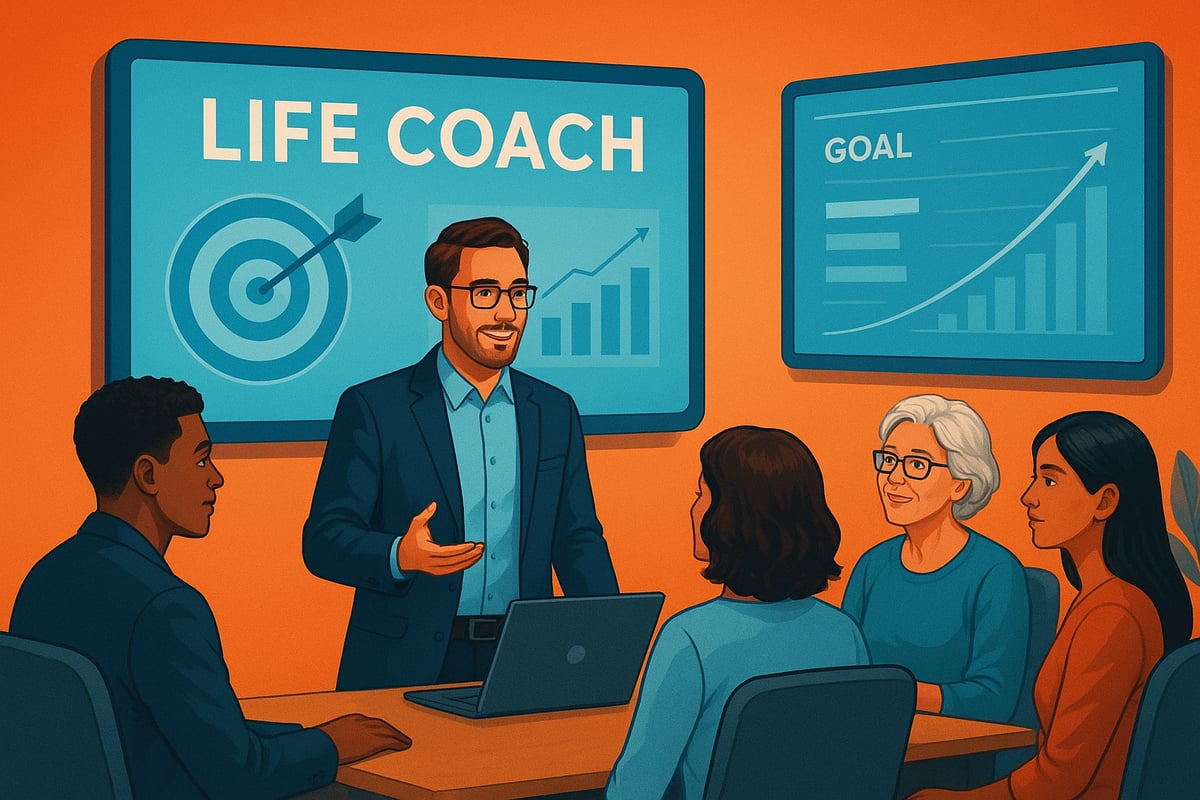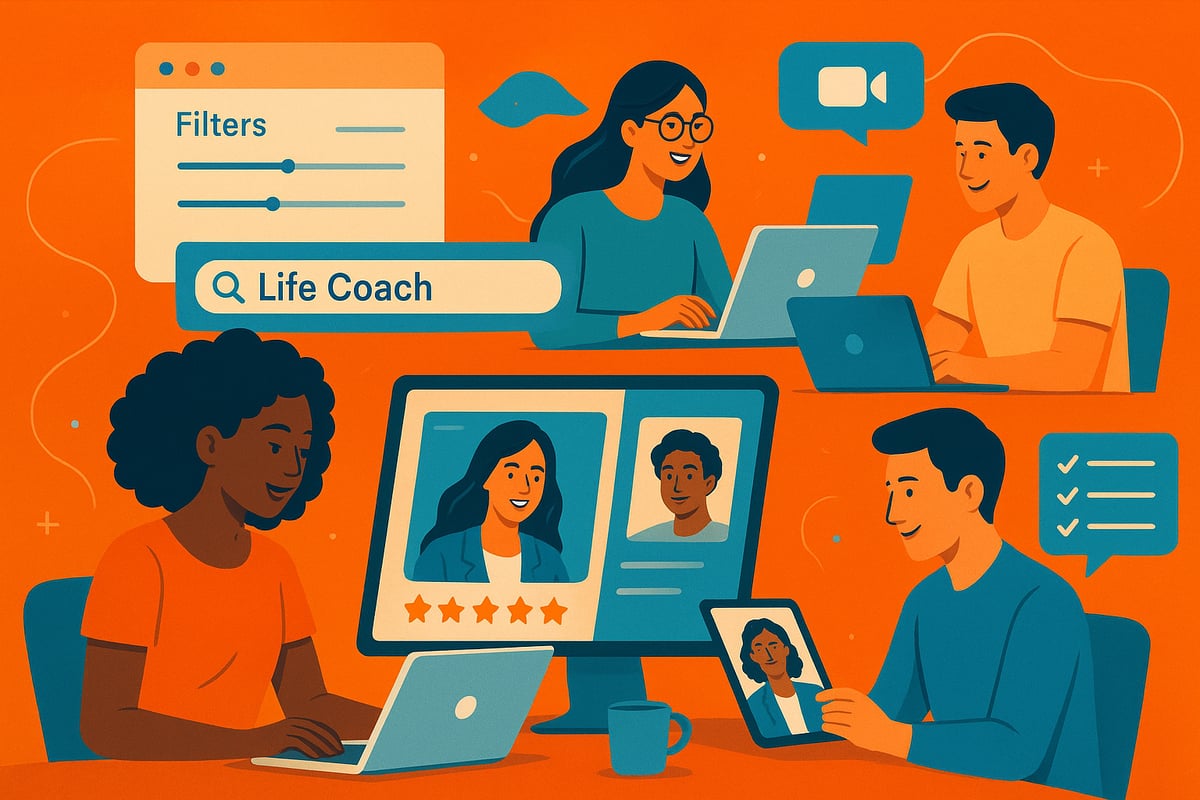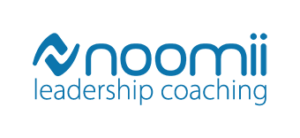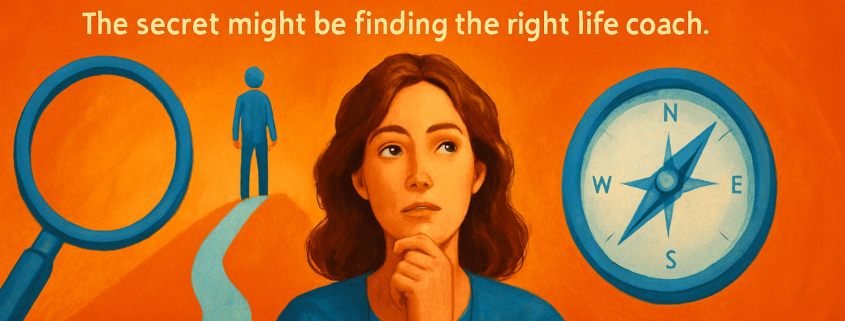How To Find A Life Coach: Guide For Success In 2025
Ready to make 2025 your breakthrough year? The secret might be finding the right life coach. More people than ever are turning to life coaching for real, measurable changes in their personal and professional lives.
Imagine having a dedicated partner who helps you clarify your vision, overcome challenges, and achieve your most ambitious goals. A life coach can be the catalyst that turns your aspirations into reality, providing support, focus, and proven strategies along the way.
This guide will show you exactly how to find a life coach who fits your needs and accelerates your growth. Inside, you will learn what life coaching truly is, how to identify your unique goals, what qualities to look for in a coach, where to search in 2025, and how to make a confident final choice.
Get ready to unlock your potential. Your journey to success starts here.
What Is a Life Coach and Why Work With One?
A life coach is a trained professional who partners with clients to set and achieve meaningful personal or professional goals. Unlike therapists, who focus on healing past issues, or mentors and consultants, who give direct advice, a life coach helps you move forward with clarity and purpose. If you are exploring how to find a life coach, understanding these differences is essential for choosing the right support.
Working with a life coach brings distinct benefits. Clients often experience greater accountability, improved clarity, mindset shifts, and practical strategies for growth. According to the ICF 2025 Global Coaching Study, over 80% of coaching clients report increased self-confidence, while 70% see better work performance. Influential voices like Tony Robbins emphasize that coaching unlocks potential and sustains momentum. These results highlight why knowing how to find a life coach can make a measurable difference.
Life coaching is not just for executives or people with problems. In 2025, demand is rising as more people seek virtual and remote coaching options. Outcomes range from career advancement and stronger relationships to healthier habits and resilience. Specialties include:
- Career coaching
- Health and wellness coaching
- Business and executive coaching
- Relationship coaching
- Financial coaching
Selecting the right specialty ensures your journey is tailored to your unique goals.

Step 1: Identify Your Goals and Coaching Needs
Before you start learning how to find a life coach, take time to reflect on your own needs and ambitions. Self-assessment is the foundation of a successful coaching experience. Knowing what you want to achieve helps you find a coach who can truly support your growth.
A practical way to start is by using the Wheel of Life Self-Assessment Tool. This tool lets you rate your satisfaction in key areas, such as career, health, relationships, finances, and personal growth. Seeing your life at a glance makes it easier to spot where you need support.
Common coaching goals include advancing your career, improving work-life balance, building self-confidence, enhancing health, or nurturing relationships. For example, someone hoping to switch careers will benefit from a coach with transition expertise, while a person seeking better balance might prefer a wellness-focused approach.
Ask yourself: What is my biggest challenge right now? What does success look like for me in the next six months? By answering these questions, you clarify your priorities and make how to find a life coach much simpler.
A targeted approach not only saves time but also increases your return on investment. The clearer you are about your goals, the faster you will see real results from coaching.

Step 2: Know What to Look For in a Great Life Coach
Choosing the right guide is critical when learning how to find a life coach who will genuinely support your transformation. The search is not just about credentials but also the human connection and proven methods that drive real change.

Essential Qualities of Effective Coaches
When considering how to find a life coach, focus on core attributes that set top coaches apart. The most effective coaches excel at building rapport and communicate with empathy and clarity. They listen deeply, ask insightful questions, and provide honest, constructive feedback.
A great coach will hold you accountable, ensuring you follow through on commitments. They inspire you to visualize a compelling future and help you leverage your strengths and resources. For example, Tony Robbins’ Results Coaches complete over 250 hours of training to guarantee consistent, high-impact support.
Research shows that clients with coaches who provide accountability are 95% more likely to reach their goals. The best professionals empower you to grow independently, rather than fostering dependency.
Credentials, Experience, and Specialization
Credentials matter when deciding how to find a life coach you can trust. Look for formal training, reputable certifications like ICF or NLP, and evidence of ongoing professional development. Reviewing a coach’s track record through testimonials and measurable client outcomes is essential.
Specialization is also key—select someone whose expertise matches your goals, be it career, business, or wellness. For instance, a financial coach with a proven budgeting system may offer more targeted value than a generalist. Alignment with your values and coaching style is crucial.
To ensure high standards, consider referencing the ICF Core Competencies 2025 when evaluating candidates. Be cautious of vague promises, lack of transparency, or missing references.
Step 3: Where and How to Find Your Ideal Life Coach in 2025
Searching for the right coach is easier than ever in 2025. With a wealth of digital resources and networking opportunities, knowing how to find a life coach that aligns with your goals is crucial to your success.

Online Directories and Coaching Platforms
A practical starting point for how to find a life coach is leveraging online directories. Platforms like Noomii, CoachCompare, and Paperbell allow you to search by specialty, location, and credentials, making it easy to compare options. On Noomii, you can read detailed profiles, browse verified testimonials, and even try up to five free sessions with different coaches.
Use advanced filters to narrow your search to specific needs, such as finding a health coach for women over 40 or an executive coach for tech startups. Always review client reviews and case studies for a clearer picture of results.
Social Media, Referrals, and Events
Another effective approach to how to find a life coach is tapping into social platforms and community events. Follow potential coaches on LinkedIn, Instagram, or YouTube to observe their communication style and values. Many coaches host webinars, workshops, or virtual meetups where you can interact directly and ask questions.
Referrals from colleagues, friends, or professional groups can lead you to trusted coaches who have delivered measurable results. Attend industry events or online summits to discover coaches you might not find elsewhere. Be cautious of coaches with little online presence or negative reviews, and always verify credentials before committing.
Step 4: Evaluate and Interview Potential Coaches
Narrowing your options is a critical step in how to find a life coach who truly fits your needs. Start by preparing a shortlist of three to five coaches whose experience, credentials, and coaching styles align with your goals. Use your notes from earlier steps to guide this selection.
Schedule introductory calls or free discovery sessions with each candidate. During these conversations, ask about their coaching process, success stories, session frequency, pricing, and any guarantees. Key questions include:
- What is your typical approach to client challenges?
- Can you share measurable results from past clients?
- How do you track progress and maintain accountability?
- What is your preferred communication method and availability?
- Do you offer group programs or only one-on-one sessions?
Assess the chemistry during each conversation. Do you feel listened to, challenged, and inspired? Request references or client testimonials for added credibility. Comparing approaches is also important—some coaches use structured programs, while others customize plans for each individual.
| Coaching Format | Pros | Cons |
|---|---|---|
| 1-on-1 Sessions | Personalized, flexible, focused | Higher cost, less peer support |
| Group Programs | Community, shared learning | Less individualized |
Discuss logistics like virtual vs. in-person sessions, time zones, and communication channels to ensure a seamless experience.
For those wanting to streamline how to find a life coach, the Life Coach Directory and Search provides a trusted platform to compare coaches by specialty, credentials, and verified client reviews.
Ultimately, the right fit blends expertise, coaching style, and a personal connection.
Step 5: Make Your Decision and Start Your Coaching Journey
Choosing your coach is a pivotal moment in your journey. Review your notes from each interview and trust your instincts. If you are unsure, start with a trial period or a short-term package. This approach helps you test the fit before making a long-term commitment, which is a smart move when considering how to find a life coach that truly matches your needs.
Set clear expectations from the start. Define your goals, determine milestones, and establish regular feedback loops. Discuss how you will measure progress, whether through check-ins, progress tracking, or specific KPIs. Many coaches recommend celebrating quick wins to build momentum early in the process.
Accountability is a cornerstone of lasting change. Research shows clients who commit to consistent sessions make progress three times faster. For more insights into how coaching accelerates growth and builds resilience, explore the Building Personal Resilience Guide. Consider working with specialists in accountability, such as Accountability Now, to ensure you stay on track and achieve your goals.
Stay open, review your progress regularly, and adjust your goals as needed. Remember, how to find a life coach is only the first step—your dedication and willingness to act are what truly drive success.




Leave a Reply
Want to join the discussion?Feel free to contribute!